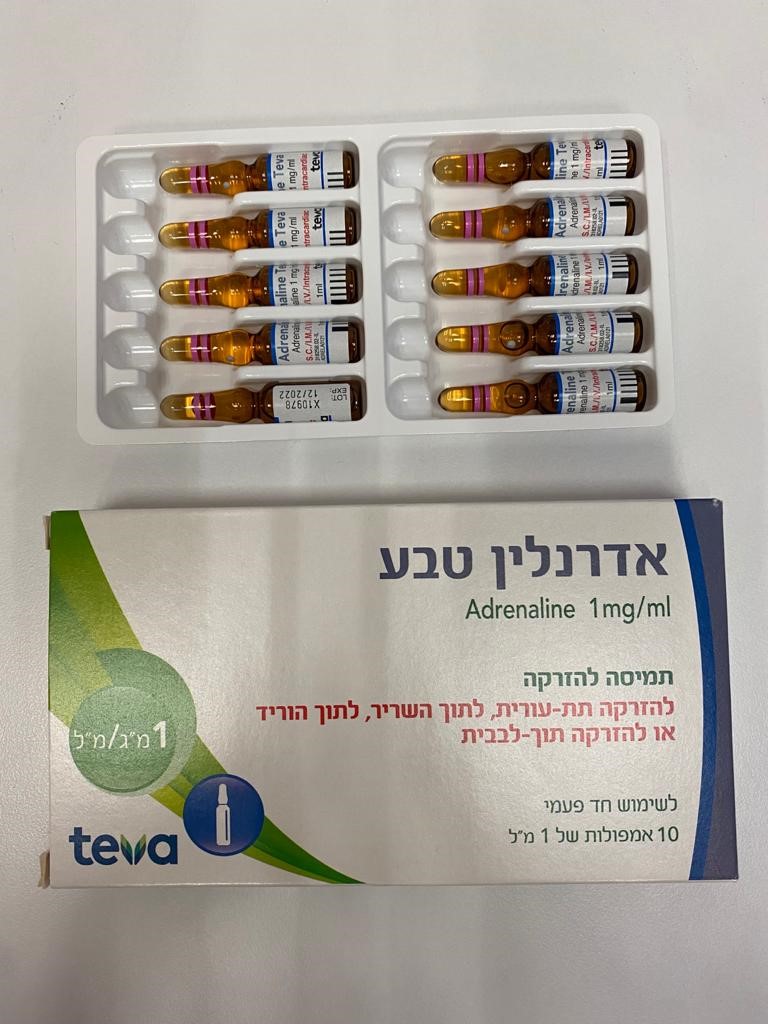Quest for the right Drug

אדרנלין טבע ADRENALINE TEVA (EPINEPHRINE)
תרופה במרשם
תרופה בסל
נרקוטיקה
ציטוטוקסיקה
צורת מתן:
תוך-שרירי, תוך-ורידי, תת-עורי, תוך לבבי : I.M, I.V, S.C, INTRACARDIAC
צורת מינון:
תמיסה להזרקה : SOLUTION FOR INJECTION
עלון לרופא
מינוניםPosology התוויות
Indications תופעות לוואי
Adverse reactions התוויות נגד
Contraindications אינטראקציות
Interactions מינון יתר
Overdose הריון/הנקה
Pregnancy & Lactation אוכלוסיות מיוחדות
Special populations תכונות פרמקולוגיות
Pharmacological properties מידע רוקחי
Pharmaceutical particulars אזהרת שימוש
Special Warning עלון לרופא
Physicians Leaflet
Interactions : אינטראקציות
4.5 Interaction with other medicinal products and other forms of interaction – Adrenergic blockers Due to antagonism with adrenaline, adrenergic blockers and adrenaline should not be administered in combination, except in the case of adrenaline intoxication. Concomitant administration of adrenaline and beta-blockers, such as propranolol, causes an increase in blood pressure due to vasoconstriction, followed by reflex bradycardia and occasionally arrhythmias. The bronchodilator effect is also inhibited. In contrast, after the administration of cardioselective beta-blockers, such as metoprolol, blood pressure and heart rate are minimally affected. Low doses of cardioselective beta-blockers seem not to interfere with adrenaline- induced bronchodilation, although the effect at higher doses has not been established. – General anaesthetics such as chloroform, halothane or cyclopropane These anaesthetics may sensitise the myocardial tissue. This increase in cardiac irritability may result in the occurrence of ventricular arrhythmias, tachycardia and ventricular fibrillation (see section 4.3 Contraindications). – Cardiac glycosides Concomitant administration with digitalis glycosides increases the possibility of ventricular arrhythmias due to additive effects. In addition, adrenaline has a hypokalaemic effect which may increase susceptibility to cardiac arrhythmias caused by digoxin and other cardiac glycosides (see section 4.4 Special warnings and precautions for use). – Drugs that cause potassium loss, including corticosteroids, potassium-depleting diuretics, aminophylline or theophylline The hypokalaemic effect of adrenaline is potentiated and it is recommended that patients have their plasma potassium concentrations monitored (see section 4.4 Special warnings and precautions for use). – Antidepressants This concerns mainly tricyclic antidepressants, which decrease adrenaline reuptake at the adrenergic endings, with an intense pressor response. – Catechol-O-methyltransferase (COMT) inhibitors Adrenaline is metabolised to a large extent by the enzyme catechol-O-methyltransferase or COMT. The combination of adrenaline and a COMT inhibitor may potentiate the chronotropic and arrhythmogenic effects of adrenaline. – Guanethidine The combination of guanethidine and adrenaline may cause a severe hypertensive reaction. If possible, combined administration should be avoided. However, if they are used concomitantly, blood pressure should be monitored. – Monoamine oxidase inhibitors (MAOIs) MAO metabolises and inactivates adrenaline. However, MAOIs do not markedly potentiate the effects of adrenaline. In spite of this, it is not advisable to administer MAOIs and adrenaline in combination. – Hypoglycaemic drugs Due to antagonism with respect to adrenaline, which induces hyperglycaemia, higher doses of insulin or synthetic hypoglycaemic agents are required.

שימוש לפי פנקס קופ''ח כללית 1994
Status asthmaticus (in children only), anaphylactic shock, anaphylactoid reaction, cardiac arrest
תאריך הכללה מקורי בסל
01/01/1995
הגבלות
תרופה שאושרה לשימוש כללי בקופ'ח
רישום
027 62 21638 21
מחיר
0 ₪
מידע נוסף
